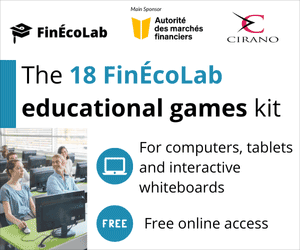Undergraduate business students Evan Adair, Garrison Glatz, and Kayla Odidison are proud to bring home Asper's biggest international competition win this season, placing first at the Scotiabank International Case Competition (SICC).
Hosted by Ivey Business School (Western University), SICC challenged teams from five continents to vie for the top prize in the preliminary round and two rounds of live competition.
The first round: AI-enhanced medical technology
Tenomix, a medical technology company, was the focus of the first round. Adair, Glatz, and Odidison had five hours to prepare a market strategy for the firm's flagship product. The "Lymphonator" uses artificial intelligence (AI) and ultrasound imaging to refine cancer screening and staging.
With an hour to practice and just 15 minutes to convince the judges of their strategy, the team focused on the quality of their research and their biggest strength as a team.
"We knew it was our presentation style that set us apart," says Odidison.
A new way to present
At the suggestion of their coach, Judy Jayasuriya (Instructor and Lead, Experiential Learning), the team tried out a new presentation style for this competition.
Instead of each team member speaking on separate sections and slides, they made an effort to hand off the mic more frequently. With each slide, every team member spoke.
"In the earlier practices, when we were first trying to implement this style, it was very chaotic," Adair notes.
But with practice and polish, transitions were smoothed and chaotic became dynamic. And the judges noticed.
The final round: Standing out in AI-saturated markets
After coming in a close second in the first round, the team tackled a second and final case featuring Armilla AI. Armilla provides AI model risk detection.
"So, if you have an AI model that you're building, you would go to this company and they test it to find out whether its prone to bias or another kind of error," Glatz explains.
The team was challenged to drive growth and determine if the firm should focus solely on detection or expand to offer more insurance services as well.
Securing their place in the finals, Adair, Glatz, and Odidison offered a strategy that pursued both options build on the strength of the detection service while standing out in the newer market of AI liability insurance.
As it turns out, a strong idea with exceptional delivery is a recipe for success.
"The judges loved the structure and sense of organization of the presentation. They felt that our team was the most cohesive and presented the strongest business case for the firm," said Jayasuriya [BComm(Hons)/10, BA/12, MBA/14]. And the Asper team earned first place, beating out Ateneo de Manila University and the University of Alabama on the podium.
A case for career growth
With travel, intense practice and preparation sessions, and high-intensity presentations (all under a tight timeline!), a case competition can be a whirlwind.
Once they returned to Winnipeg, trophy in tow, the team reflects on the experience, as students and team members.
Adair and Odidison, both hoping to graduate in 2026 and pursue their CPA designation, see case as a valuable experience in their respective career journeys.
"Being able to complete cases has really allowed me to understand how to analyze a business, both qualitatively and quantitatively, helping me prepare for the case-based CPA program," says Odidison.
Adair highlights the soft skills (collaboration, teamwork, public speaking) as well as the key technical skills he has developed through case. "PowerPoint, financial modeling, Excel shortcuts, research these are all examples of hard skills that I felt I dramatically improved since I started doing case," he says.
For Glatz, a finance major graduating this year, case feels like a natural fit for his ambitions to work in the industry before branching out into something broader politics, economics, central banking policy.
"Case gives me an opportunity to learn about a lot about different companies and fields and sharpen my critical thinking skills in the process," he says.
What's in a team
As Adair, Glatz, and Odidison recount their case experience, there's a familiarity and exchange; it's inviting, persuasive, fun. They can laugh about a team member's quirks (Glatz's flexible relationship to urgency, Adair's "crashing out" pose, Odidison's preferred snack and full-time role as devil's advocate) and in the same breath earnestly highlight what they bring to the team. Glatz knows how to come up with ideas, a lot of them; Adair can present the most complex numbers like it's a conversation; Odidison knows how to refine an idea and delivery it flawlessly.
As they share their case story, it's not hard to see what the judges saw.

Adair, Glaza, and Odidison. Photo by David Lipnowski.
Coached by Judy Jayasuriya, the SICC team was supported by Howard Harmatz, Nolan Ward, Cole Hutchison, Chelsea Kokan, Bhaumik Gandhi and Tamara Nelson.
Case competitions give students an opportunity to showcase complex problem-solving skills in diverse teams. A cornerstone of experiential learning at the Asper School of Business, case connects students to top business school and industry experts around the world and right here in Manitoba. Learn more about case competition opportunities at the Asper School of Business.












